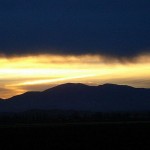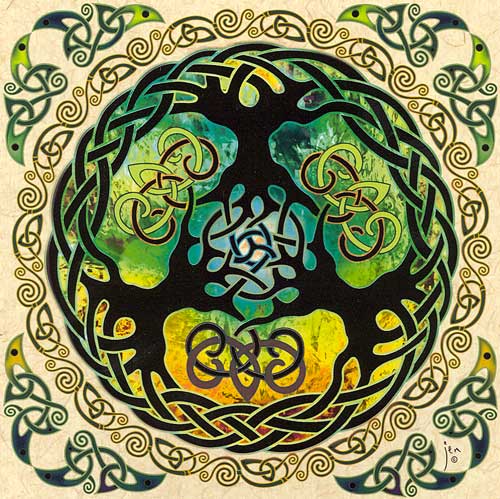 This past weekend, Mt. Toby Friends Meeting held a weekend-long retreat. About sixty Friends gathered at Woolman Hill, a Quaker retreat center that’s about half an hour to the north. Many of us stayed there Friday and Saturday nights; others commuted. The Friends attending included slightly more than half the regular attenders at our meeting.
This past weekend, Mt. Toby Friends Meeting held a weekend-long retreat. About sixty Friends gathered at Woolman Hill, a Quaker retreat center that’s about half an hour to the north. Many of us stayed there Friday and Saturday nights; others commuted. The Friends attending included slightly more than half the regular attenders at our meeting.I have had this at a couple of points in my life. At Oberlin I felt like organic gardening and left-wing Christianity could save the world, and in the Oberlin Farm Co-op I felt like we were beginning to do it. In my 30’s, in the Church of the Sacred Earth, I felt like we were inventing a new religion and finding new ways to connect with the Divine. Cat and I were newly in love, and as a couple we provided a “seed crystal” for a group house, and around that a coven, and around that a whole rich and vibrant Pagan community. It was exhausting and volatile and often painful, but at the same time full of meaning and hope and love.
The loss of Christianity in my 20’s was a wrenching experience that left me feeling shattered. Entering my 40’s as a Pagan, I did not lose my faith so much as I simply came to feel I had followed that path to its end. I had come out on a plateau, and from there I would need to find another path if I wanted to keep growing. Quakerism provided that further path, with new ways to touch and be touched by the Divine, and with people who were wiser than me and had much to teach me. But that heady, almost narcotic sense of community that I’d felt in the Farm Co-op and in Paganism was still lacking. It seemed like it would always be lacking—like seeking that level of community among Quakers was like looking for the sensuality of Bouguereau in the works of Grant Wood.
In another exercise this weekend, someone read a passage from First Corinthians, in which Paul compares the members of a church to the parts of a body.
Now the body is not made up of one part but of many. If the foot should say, “Because I am not a hand, I do not belong to the body,” it would not for that reason cease to be part of the body. And if the ear should say, “Because I am not an eye, I do not belong to the body,” it would not for that reason cease to be part of the body. If the whole body were an eye, where would the sense of hearing be? If the whole body were an ear, where would the sense of smell be? But in fact God has arranged the parts in the body, every one of them, just as he wanted them to be. If they were all one part, where would the body be? As it is, there are many parts, but one body.
1 Corinthians 12:14-20 NIV
We were then given sticky notes and asked to put our names on a big outline of a body to show which “body part” we felt like we are at Mt. Toby, and also which we wished we were. I surprised myself a little when I went straight for the solar plexus, placing myself at the gravitational center of the meeting. I haven’t always felt like I was that central there. Next, we broke up into groups of six or seven for worship sharing and worshipful discussion. And it was there, in those 45 minutes or so, that I—and I think a critical mass of Mt. Toby Friends—tapped into a level of spiritual intimacy that I hadn’t been sure Quakers were capable of. We talked of our visions for community, and the ways we have searched for community in our lives. We talked of what happens in worship, and how difficult it is to express in words what worshiping in silence means to us. And in so doing, we peeled back layers of ourselves to expose deeper and deeper truths.
Quakers worship in silence. In that silence, we often feel a deep sense of connection and intimacy with one another, but it’s difficult to carry that out into the fellowship room afterwards. One Friend last weekend spoke of how shocking it was, after being part of the meeting for ten years, to realize that no one knew she had been dealing with a serious illness that whole time. “I guess I assumed everyone could read my mind during worship,” she said. The experience of gathered worship is so profound that it’s not such a crazy assumption.
At the end of the weekend, going around in a closing circle for each of us to say what we had gotten out of it, I talked about getting to know and be known by the Friends in meeting, and I called for two things: “Let us never forget how precious this is. And let us never forget that we can do it.”
I think we can do this in the wider Quaker world as well. And I think it is vitally important that we do so.
I see Friends in the more Christ-centered branches of Quakerism using Christian language and Biblical reference points to anchor themselves in the deep, spiritual dimensions of their practice. It works for them—works so well, in fact, that if they were asked to give up the particularity of Christian myth, they would feel robbed of their voice, unable to speak about their religious experience at all.
That same Christian language is deeply alienating to many Friends, who often come to Quakerism as refugees from Christian churches of the kind Jesus was talking about when he said,
Woe to you, teachers of the law and Pharisees, you hypocrites! You shut the kingdom of heaven in men’s faces. You yourselves do not enter, nor will you let those enter who are trying to.
Matthew 23:13 NIV
Talking to one another across this kind of theological divide is hard. It is hard enough that many liberal Friends shy away from talking at all about what happens in worship, afraid of giving offense or of being offended, afraid of being shut down or told to shut up. We worship together in the deep intimacy of silence, but like the Friend with the serious illness, often we rely on mind-reading when really we need to be talking.
I know, from a lot of interaction with Christ-centered Friends over the ten years that I’ve been Quaker, that we liberal Quakers sometimes look like we have no spiritual center at all. Writers like Pink Dandelion talk about the silence in worship as a defense against admitting how little we have in common any more. Martin Kelly is even more articulate and impassioned:
Every week our Meetings for Worship bring together people of radically different beliefs and non-beliefs. Instead of worship, we have individual meditation in a group setting, where everyone is free to believe what they want to believe. This isn’t Friends’ style and it’s not satisfying to many of us. I know this statement may seem like sacrilege to many Friends who value tolerance above all. But I don’t think I’m the only one who would rather worship God than Silence, who longs for a deeper religious fellowship than that found in most contemporary Meetings.
He’s wrong. At least, if he’s talking about Mt. Toby Monthly Meeting, he’s wrong. But I’ve long since given up debating this issue in on-line forums or in writing, because ultimately all I can say is, Come worship with me. Feel the Spirit gather us and cover us in meeting, you and me both, and then maybe, if we both hold ourselves radically open and listen prayerfully to one another, we can begin to talk about our theological diversity.
At the same time, I’m not sure that he isn’t right about some liberal Friends. The fact that we lack a vocabulary to express what it is we experience when a theologically diverse body is worshiping together in a gathered meeting makes it really hard to know how much we really share of our experiences of worship.
We are blessed, at New England Yearly Meeting, with the opportunity to labor together over this very question. As part of both Friends General Conference and Friends United Meeting, NEYM includes a wide spectrum from the very liberal to the evangelical. In past years, I used to describe us as “teetering on the brink of schism,” but this past year we seemed to push through to a place of greater unity. The phrase that came out of the 2011 Sessions was “listening in tongues,” and it describes the way liberals and evangelicals can try to hear into one another’s language, metaphors, and mythology, getting down to the root experience of worship that we all share.
The best way to help each other hear is to say more. At the Mt. Toby retreat, we explored new ways of sharing, just within our little monthly meeting community, the ways that we experience and conceptualize our worship. We begin with the people we know best, the community we worship with every week. We peel back layers amongst ourselves, finding the words to keep us low to the truth and share what we know experientially of God. And we will hold that truth as we interact with the wider Quaker world.
We are a circle
Within a circle
With no beginning
And never ending.
















